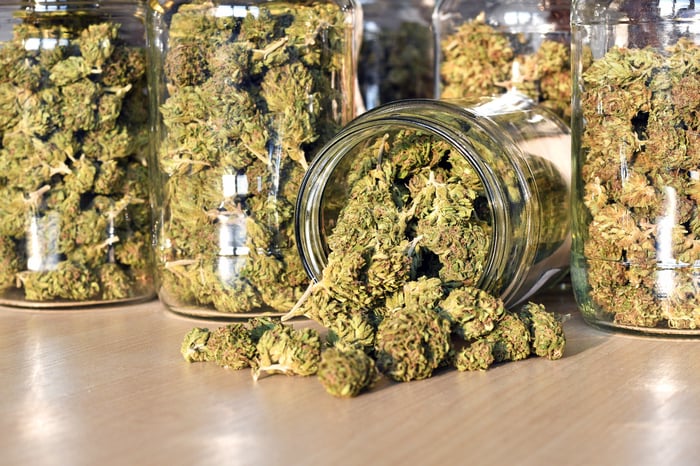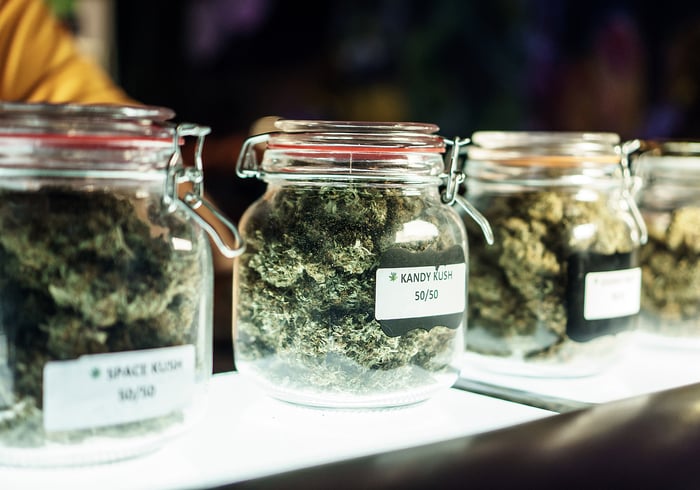
IMAGE SOURCE: GETTY IMAGES.
These 13 marijuana stocks sport billion-dollar valuations
Today, the 13 largest pot stocks all sport a billion dollar-plus market cap. And when I say “pot stocks,” I’m talking about pure-play businesses, and not a company like Molson Coors Brewing that has a small percentage of its operations devoted to researching and developing cannabis-infused beverages. Here are those marijuana stocks, listed in descending order, based on their market caps as of Feb. 3, 2019.
1. Canopy Growth: $16.8 billion
Canopy Growth (NYSE:CGC) is the cannabis kingpin, and it’s not even close. Following an equity investment of $4 billion from Corona and Modelo beer producer Constellation Brands, upping its stake in the company to 37%, Canopy has more cash than it knows what to do with, and it’s been putting this capital to work. It recently was awarded a hemp-producing and processing license in New York, and it acquired hemp-based research company ebbu from Colorado in November. As the company with the most mature sales channels, best-known pot brands, and more than 500,000 kilograms in peak annual yield, Canopy Growth well deserves its spot at the head of the table.
2. Tilray: $7.6 billion
At one point in 2018, Tilray (NASDAQ:TLRY) briefly doubled up Canopy Growth’s market cap, but it didn’t last long. The Canadian grower best known for its medical cannabis brands and devotion to medical marijuana research, became the first company to IPO on a major U.S. exchange in July. Tilray also snagged two major deals in December -– a distribution partnership with Novartis‘ generic-drug subsidiary Sandoz, and a joint venture with Anheuser-Busch InBev to develop cannabis-infused beverages. This year will probably see Tilray work on potentially doubling its production capacity.

IMAGE SOURCE: GETTY IMAGES.
3. Aurora Cannabis: $7.4 billion
Aurora Cannabis (NYSE:ACB) may only be the third-largest pot stock by market cap, but it’s projected to be the largest grower by annual output. The company has conservatively called for “in excess of 500,000 kilograms” annually at peak capacity, but this was before it completed its ICC Labs acquisition in South America. Aurora Cannabis’ production potential now probably lies around 700,000 kilograms per year at its peak. If share-based dilution were to slow in 2019, Aurora Cannabis could potentially leapfrog Tilray for the No. 2 spot.
GW Pharmaceuticals (NASDAQ:GWPH) is the only cannabinoid-based drug developer on the list. It’s worth nearly $5 billion thanks to the approval of cannabidiol (CBD)-based Epidiolex in June for the treatment of two rare types of childhood-onset epilepsy. CBD is the non-psychoactive cannabinoid best known for its perceived medical benefits. GW Pharmaceuticals’ lead therapy is the first cannabis-derived drug to get the nod of approval from the Food and Drug Administration. It was launched at the beginning of November and, for the time being, is the only approved treatment for patients with Dravet syndrome.
5. Cronos Group: $3.7 billion
Pretty much no pot stock has risen up the ranks faster of late than Cronos Group(NASDAQ:CRON). Shares of the company have essentially doubled since tobacco giant Altria announced that it would be making a $1.8 billion equity investment in Cronos, which equates to a 45% stake in the company. Warrants given to Altria, assuming closing of the investment, would allow this equity stake to eventually be increased to 55%. Essentially, Wall Street and investors see this as a win-win for Cronos Group. Either Altria will purchase it, or it now has more than enough cash to execute its long-term growth strategy.

IMAGE SOURCE: GETTY IMAGES.
6. Curaleaf Holdings: $3.3 billion
Though they may not be in the top five by market cap, vertically integrated dispensaries — i.e., dispensaries that have growing and/or processing operations in the same state(s) as retail operations — are abundant throughout the remainder of this list. Curaleaf Holdings has what’s arguably the largest breadth of any current dispensary. As of Jan. 11, Curaleaf operated 42 dispensaries and had 12 grow sites and 10 processing facilities, with these assets spread across a dozen states, soon to be 13. By year’s end, the company will be approaching close to 70 open dispensaries.
7. Acreage Holdings: $2.6 billion
Like Curaleaf, Acreage Holdings has vertically integrated operations in 14 states, albeit it has licenses in place to expand to 18 states. It’s currently operating dispensaries, grow farms, and processing sites, but it also offers management services operations and other financial arrangements within the cannabis industry. Acreage also has a very powerful board of directors, which includes former Speaker of the House John Boehner, and former Canadian Prime Minister Brian Mulroney. As with most dispensaries, expansion is on the docket for much of 2019.
8. Aphria: $2.4 billion
Once among the largest of all pot stocks, grower Aphria (NYSE:APHA) has tumbled following allegations from short-side firms Quintessential Capital Management and Hindenburg Research. The report suggests that Aphria paid an overinflated price for three Latin American assets, which the company has vehemently denied. However, the damage has been done on a trust basis, and Aphria could take some time to recover. Meanwhile, longtime CEO Vic Neufeld is out, and the company remains on track for 255,000 kilograms in peak production, which might be good enough for the No. 3 spot in terms of output in Canada.

IMAGE SOURCE: GETTY IMAGES.
9. Green Thumb Industries: $2.1 billion
Green Thumb Industries is another of the many vertically integrated dispensary operators throughout the United States. On Jan. 29, it opened its 15th retail location in the U.S., with its stores bearing the RISE brand name. However, Green Thumb Industries has retail licenses for as many as 70 stores in nine states, to go along with the 10 manufacturing facilities it already has. Like most dispensary operators, Florida is a big focus, with the company planning to open as many as 30 medical marijuana dispensaries in the Sunshine State.
10. MedMen Enterprises: $1.5 billion
Surprise! It’s another vertically integrated dispensary. MedMen Enterprises(NASDAQOTH:MMNFF) may only have just over a dozen open stores, but it’s possibly the best-known retailer given its upscale approach and desire to normalize the cannabis buying experience. MedMen is currently in the process of acquiring privately held PharmaCann for $682 million — it will be the largest U.S.-based pot deal in history, if completed — which will double the number of states it has access to and more than double its grow sites and processing facilities. All told, the duo has more than 70 retail licenses at its disposal.
11. Charlotte’s Web Holdings: $1.5 billion
Notice that there are a lot U.S.-based companies on this list? Charlotte’s Web Holdings, a manufacturer and retailer of CBD-based products in more than 3,000 retailers across the U.S., is testimony to the opportunity that lies in the U.S. market. Although Charlotte’s Web can’t make any medical claims with its products, as they’ve not been reviewed by the Food and Drug Administration, the legalization of hemp and hemp-based CBD from the signing of the Farm Bill opens the door to increased CBD usage. And did I mention it’s already profitable on an operating basis?

IMAGE SOURCE: GETTY IMAGES.
12. Trulieve Cannabis: $1.3 billion
The final vertically integrated dispensary on this list is Trulieve Cannabis. Unlike the other dispensaries on this list, which are broadening their reach to numerous states, Trulieve has almost entirely been focused on the Florida market. To date, it has 24 open dispensaries in Florida, although it has made acquisitions that’ll allow it to enter California and Massachusetts. Since Trulieve has been focused on a single state, it’s been able to keep its expenses manageable, leading to a rare operating profit among dispensaries. Whether it stay that way in 2019 with two new states added to the mix remains to be seen.
13. HEXO: $1.2 billion
Last, but not least, Canadian grower HEXO, which recently uplisted to the New York Stock Exchange American boards, rounds out the list of billion-dollar pot stocks. HEXO first made a name for itself in April by landing a five-year supply deal with Quebec that’ll deliver an aggregate of 200,000 kilograms of production. Given that HEXO expects only 108,000 kilos per year at its peak, this represents a big portion of its future production. HEXO also landed a joint venture with Molson Coors Brewing in August, which may allow it to be a leading cannabis-infused beverage producer.
More at: Fool.com






